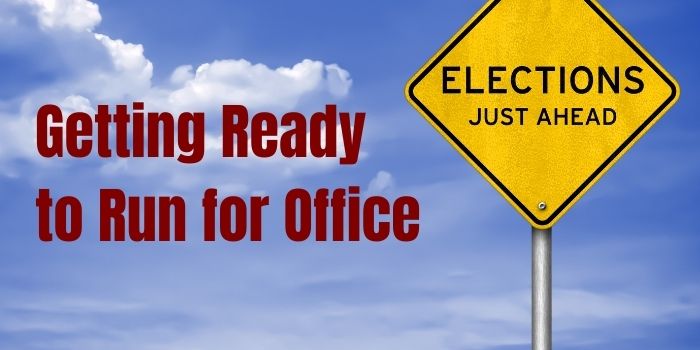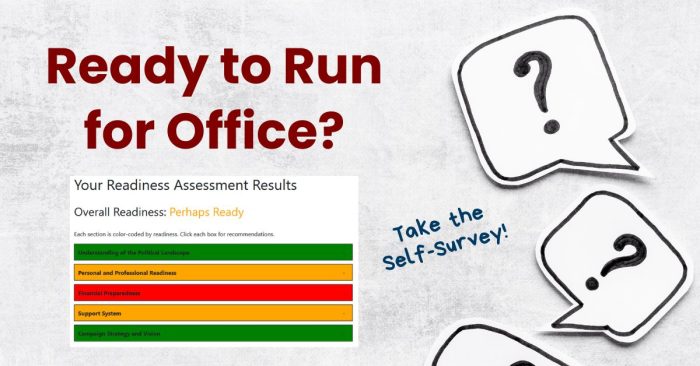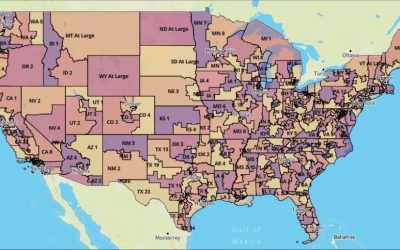Preparing for Candidate Debates
Some campaigns will have debates or forums as an opportunity for candidates to present themselves and their platforms to the public. The rules and formats of these debates vary and are agreed upon by the candidates and moderators ahead of time.
Here are tips to improve your public debate skills:
Before the debate, try to anticipate the arguments that might be made by other candidate(s). Research and facts are critical. You need to be prepared on both sides of the debate topics. Come up with answers against your own points in addition to your opposition’s. Have others help you in preparing a ‘mock debate’. Let them poke holes in your arguments and practice your facts until you know them cold. Learn your weaknesses and those of your opponent.
Prepare your opening remarks or introduction as you could for any other speech. You may want to include an opening quote or fact that is related to a major debate issue. Start off your position by stating these proven points. This helps make your positions easier to defend going forward.
Cross examination is to clarify points or to add explanation to a point or fact that you didn’t understand. Don’t argue with the other candidate(s), either. During cross-examination, don’t make statements when asking questions. You should already know the questions you want to ask beforehand. When you are finished, use what you can from their answers and incorporate their statements into your rebuttals.
Respond to every point your opponent mentions. By not responding to a point during a debate, it is assumed that you agree with them. Be prepared to counter every argument. If you are attacked, confront the attack (or insult, if it’s personal), and reply by transitioning what is said into one of your talking points.
During rebuttals, show the audience the contrasts between you and your opponent. This is done by restating and re-arguing your own points.
Keep your cool. Want to lose an argument fast? Just lose control on stage. Don’t let your opponent knock you off your message or drive you to an emotional outburst. Focus on keeping calm and staying on message.
Public debates can make or break a local campaign. Be sure to prominently announce the debate on your campaign site and keeping your email and social subscribers up to date. The more supporters a candidate can get to attend a debate, the better. A friendly crowd (and adequate preparation) should help make the event a success.
Additional Debate Resources:


Online Candidate provides affordable campaign website and marketing to solutions to large and small political campaigns.
How to Prepare for a Run for Local Office
Running for elected office is one of the best ways you can give back to your community. Whether you want to run for city council, mayor, or even the school board, there are many reasons to give it a shot.
But getting yourself ready to be the ballot takes time, effort, and money. It takes personal sacrifice and extracts a toll not only from you but also from your family and close supporters.
Are you ready?
Free Tool: Are You Ready to Run for Office? Take a Self-Assessment Survey.
What to consider if you are thinking of running for office:
- Are you ready to get involved?
- What political office should you run for?
- Qualify to run
- Figure out how much the campaign will cost
- Is your family ready for scrutiny?
- Are you prepared for the realities of a political campaign?
- Start your run for local office
- File for candidacy
- Get your finances in order
- Start raising money and create a fundraising strategy
- Recruit volunteers and staff
- Learn the issues
- Public speaking and events
- Interact with your community and online
Listen to this post:
Are you ready to get involved in local government?
Local government has always been a hot topic in the United States. It has been seen as a way to get involved with your community and make a difference. Local government is not about voting on national issues but about making decisions that affect your daily life.
“Should I run for office?” That’s a question every potential candidate asks themselves at some point.
Politics isn’t for everyone. Some people may volunteer with an organization or work to advocate for an issue, but never consider participating in local or state government themselves.
But if you have reasons to think you can make a difference, go for it and run for something!
As a leader in your community, you’ll be in a position to bring about change and create a positive impact. Do you have the time and work ethic to get the job done? What are the goals for your elected position?
Every municipality has its own particular issues. Do you know what they are, and do you have ideas for dealing with them?
One way to find out what is happening is to attend local government meetings. Even as an observer, you’ll learn a lot about your current representatives and how they perform on the job. You’ll also get an idea of what local developments are happening and what may be coming in the near future.
Read the laws or bylaws that govern the responsibilities of the elected position you seek. Prepare ahead of time, and you will have a better idea of what to expect.
What political training opportunities exist?

Become educated about the election process! A number of organizations have programs, seminars, and courses for candidates so they can develop leadership and campaigning skills. These courses are also useful for community leaders, organizers, and advocates.
The organizational skills taught in these courses are not just meant for career politicians, but for anyone who wants to get involved in the electoral process. This includes citizens interested in learning more about the democratic process.
“All politics is local.” – Tip O’Neill, former Speaker of the United States House of Representatives.
What political office should you run for?
If you are interested in a public service position, it’s a good idea to research the different offices and pick one that fits your interests. The most common type of political office people are interested in is at the local level. This includes cities, towns, counties, and school districts. The position you choose should be one that suits your unique skills and experience. If you’re not sure, check the duties and requirements to see if you can see yourself filling the position.
Are you more interested in an executive or legislative position? Do you want to make laws or see that they are executed properly? What position would be the best fit for your background and experience?
- For example, if you have law enforcement experience, you might want to make a run for sheriff.
- If you are an educator, you may want to bring your expertise to your local school board.
- Are you an attorney or work in criminal justice? You may be qualified for a judicial position or as a district attorney.
- If you have particular professional experience, you may be qualified for a local board or district position, such as in a water district.
Running for local office is a great way to get your name out there, boost your public profile, and make connections. If you don’t intend on running for a higher office in the future, a local campaign can be a very rewarding experience.
Free Tips: Subscribe for free guides and updates from Online Candidate.
Popular elected positions for first-time candidates
Many people become interested in politics because they are inspired by specific issues like corruption or development. They want to make a difference in their communities by becoming an officeholder in their village, town, or city.
Here are elected positions that first-time candidates often run for:
- City Ward Member
- City Council
- Alderman
- Board of Education
- Assessor
- Town Clerk or other Town Offices
- County Legislature
- County Commissioners
- State Legislature
- County Coroner
- Local Judicial Offices – Civil and Criminal
- Special districts, authorities, boards, and commissions
Related: What Are Easiest Political Offices To Run For?
Find out the qualifications to run

To meet the basic candidate qualifications, there is always a residency and age requirement, in addition to other requirements. For example, if you are running for judge or sheriff, you may need specific training, professional experience, or educational degrees to be eligible.
If you meet the basic requirements, do you have the proper paperwork to get yourself on the ballot? Have you paid the filing fees and know the election calendar? The rules and procedures for elections vary by state, county, and even city. Missed deadlines can put you in danger of missing a primary ballot or even a general election.
Often, the position you’ll run for will be a currently available position. Do you think you can beat the entrenched incumbent? They often have the advantage of having won multiple election cycles, an established fundraising network, name recognition, and even franking privileges. If not, then you may want to run for a seat that is more winnable so that you have a better shot later in the next election cycle.
Again, the question comes down to the office you decide to seek and the reasons for doing so. If you haven’t gained experience at the local level, you’ll have a harder time getting elected to congress or state governor or legislator.
Tip: Before you begin, check your state election office and your local election office for specific rules regarding various positions. There may be specific residency, age, petition, and other requirements.
Ready to run? We offer campaign websites for candidates and political marketing services.
How much will your campaign cost?

Money (and lots of it) is the lifeblood of politics. When running for office, you must raise and spend a certain amount of money to get your message out and be competitive. If you don’t like calling on friends, family, and supporters for financial assistance, you better get used to it.
Consider talking with others who have previously run for a similar position to get an estimate of how much your race might cost. Put together a detailed budget as early as possible, using real vendor cost estimates. This will give you an idea of how much money you’ll need to meet or exceed your contribution goal.
“How can I run a campaign without money?” is a question that comes up often with new, inexperienced candidates. Running without money or a budget is no way to win. Ideas and a platform are great, but in the end, your goal is to raise money in order to spend it to build awareness and get votes.
Is your family ready for public scrutiny?
An election not only involves the candidate but also his or her family. Your home will become cluttered with literature, signs, and documents. The process will stress out your partner, and the needs of your children will be put aside. Talk with your family and friends. Let them know what changes are in store for them. Having them understand and be on board with your decision will help during the most demanding times.
Opponents will work to dig up anything embarrassing or damaging from your past. You can expect personal attacks through social media, where “trolls” hide behind screens to lob accusations in anonymity.
Every politician needs a base of support. Even if you are not a political ‘insider’, you can build your own network from personal friends, acquaintances, and people you know through organizations you belong to.
The smaller the race, the more important personal relationships can be. Local races are often won by just a handful of votes, with victory often coming down to who gets the most supporters to the polls. Personal connections can be a powerful motivator for getting out the vote.
Are you prepared for the realities of political campaigning?
Running for office is hard work. There are many things to think about and do before you can actively campaign. You have to research your opponents, figure out what your campaign platform is, how much money you will need, create a team of people to help you with everything from speech writing to strategy advice, raise funds, and more.
The campaigning process itself can be mentally and physically challenging. Are you ready and able to commit the time and personal resources necessary to participate? Canvassing, phone calling, fundraising, and events can take up an enormous amount of time and energy.
Do you have a thick skin and can you weather criticism from your opponent, the press, and segments of the public? Social media is constantly tough on politicians. Most have learned to weather, or at least tolerate, the attacks.
Anyone who has ever decided to run and serve has dealt with these issues. Rest assured that whether you win or lose your election, you will come away from the experience with a greater appreciation for the political system and all that goes with it.
Starting your political campaign the right way
Running a political campaign can be complex, and it is important to start the process early in order to make sure all the necessary steps are taken. Campaigns often begin with a focus on a specific issue or cause. This section will list some tips on how one can launch their own campaign.
First, you want to know what offices are available and open to serve. If it is your first time running, you may want to run for a position even if you have no experience in it. It’s a great way to work yourself up to higher positions.
For information on available positions, visit the website of your state’s secretary of state.You can search your state election office for information on state-wide voting guidance. You will also want to get a handle on state voting requirements and local voting information. Also, contact your local clerk for information on requirements and filing dates.
File for candidacy
Assuming you’ve met the eligibility requirements, you will need to submit your petitions, application forms, and filing fees to your county board of elections. If your filing is not submitted within the specified time frame, your petition will be considered late, and you won’t appear on the ballot.
- You can get voter file information and find out how many people are registered to vote in your district from your local board of elections or secretary of state’s office.
- Your local political party can give you access to additional resources such as voter demographics, address and email lists, and more.
Reach out to politicians in your party who have been elected and build a professional political network.
Related: Announcing Your Candidacy for Political Office
Get your campaign finances in order
To accept any political donations, you’ll need a checking account in your organization’s name. All income and expenses will need to be tracked and reported, per applicable law. A campaign committee is a legal business entity that you will need to create and register.
You will also need a way to accept online donations and a campaign website through which to do so. Digital advertising is growing every year, particularly for local races. You will also need to budget for your digital advertising.
Put together a fundraising strategy and start raising money
Fundraising should start as quickly as possible. You may be able to raise seed money to start, but few people can afford to fully fund their own election. If you don’t like to ask people for money, you can start with your family and friends. Like it or not, you will eventually be making the calls and asking others for help.
This is where your networking starts to pay off. Connect with large contributors to your party. Even on a local level, there will be individuals, companies, and organizations that consistently donate to other successful political campaigns with similar platforms. Reach out to them early for support.
As your organization grows, you will start building your own donor database for fundraising and communications. Building an email list is important for your outreach.
Those who have run before may be able to provide you with their own donor and volunteer lists. They can be a valuable resource as they can help you navigate and avoid problems that they may have had during their run.
Applicable law will dictate when and how you can raise and spend money.
Recruit campaign volunteers and staff
Running for public office is a time-consuming and expensive endeavor. You need to put together a campaign team that includes volunteers and a campaign manager. The campaign manager should be your first staff hire. He or she will help you organize the logistics of running a successful campaign.
Members of your organization should include:
- Treasurer to handle campaign finance: The treasurer is responsible for managing the financial aspects of your organization’s campaigns, including budgeting, fundraising, and financial reporting.
- Volunteer Coordinator: The volunteer coordinator recruits, organizes, and manages volunteers, ensuring they are effectively utilized and engaged in various activities and initiatives.
- Scheduler: The scheduler plays a crucial role in coordinating and managing the organization’s events, meetings, and activities, ensuring they run smoothly and efficiently.
- Telephone Supervisor: The telephone supervisor oversees the organization’s phone operations, including call centers or hotlines, ensuring clear communication and effective outreach to supporters or constituents.
- Online or Social Media Coordinator: This role focuses on managing the organization’s online presence and social media platforms, creating engaging content, and interacting with the online community to promote your cause.
- Press Secretary / Public Relations Manager: The press secretary or public relations manager handles media relations, press releases, and public communications, shaping the organization’s public image and messaging.
Even if you think you are qualified, don’t run your own campaign. Get someone else to be your campaign manager. You, as the candidate, should be out there getting potential voters to know who you are, on the phones (doing that fundraising thing), attending events, and meeting with the press.
It’s a team effort. When everyone works together, it can go a long way toward election victory.
Learn the issues and know your positions
Connect with voters and their needs. Know the important issues and be prepared to speak on them and answer questions. You also need to know your opponent’s positions. This will help you put together a strategy to differentiate yourself from your opponent.
Running for any political office can be an intimidating task. Often, it is difficult to know where or how to start because so many people are unfamiliar with this process. Training sessions are available for anyone who is interested in running and wants to learn more about what it entails.
Prepare for public speaking and events
All politicians must speak with people, both one-on-one and in groups. Although public speaking is a great fear for many, you will need to speak confidently in public settings. This is something you may need to practice if you don’t have a lot of experience speaking in front of an audience.
Interact with your community – both in person and online
The key to winning a local election is to make sure that you are a good fit for the position you are running for. Build relationships with people in your community before running, as well as create a team of volunteers that will be able to help you run your campaign online – from managing social media accounts, to making phone calls and managing email updates.
Campaigns are no longer just about TV ads, direct mail, mailers, or phone banks. Door-knocking and events allow you to really connect with voters. Personal contact matters more than ever before. This may not be possible in a large district, so you must focus on meeting those who are most likely to support you.
Build your own contact information and use this with other data, such as voter records, to reach out for donations and support.
Learn the requirements for ballot access and make sure you have staff ready to distribute information for people who need help getting an absentee ballot or meeting voting requirements.
Near the end of the race, you’ll need to go all-in on Get Out The Vote efforts. The more people you can reach, the higher voter turnout you will achieve.
A well-executed strategy is your best shot at victory!
Related:
- FAQs for First Time Political Candidates
- Preparing to Run for Political Office [PDF]
- Who To Contact To Run for Office
- So You Want To Run For City Council? Here’s How To Get Started
Ready to start? We help hundreds of candidates every election cycle with affordable campaign websites and online marketing services.
6 Ways to Add Interactivity to Your Campaign Website
Adding interactivity to your campaign website can help keep visitors engaged and provide something they can pass along to others.
Here are several easy ways to increase interactivity to your site. Best of all, you don’t need a large budget or much technical skill to add them!
Include Social Media Links
Link out to your campaign’s social media profiles, such as Facebook, Twitter and YouTube. This gives visitors the opportunity to learn more and to follow campaign news and events through alternate channels.
Another to link is to add social share buttons or links to your pages. This method helps build links to your website and attract additional visitors. There are several free tools that allow you to create custom buttons, including addthis.com and sharethis.com. Online Candidate websites built-in social media linking methods, as well as an optional social bookmarking buttons that can appear on each page.
Polls and Surveys
For local candidates with limited budgets, online surveys and polls help gather feedback and provide a way for visitors to share their opinions. Most everyone likes a quick poll, and a well-designed survey can allow visitors to share their opinions on a variety of topics.
Some free poll and survey sites include surveymonkey.com and zoomerang.com. A poll feature is included with Online Candidate websites, and outside survey code can easily be added as well.
Add a District Map
A district map makes a great addition to your voter registration page. To add a district map to your website, follow these instructions.
Include Campaign Videos
Video is a growing part of the web, and the tools and software available make it easy for just about anyone to create video. Many candidate record video from their phone to share a ‘slice of life’ on the campaign trail. This can be used to create Facebook Live posts for your page and website. Creating a campaign YouTube channel makes it easy to link and share videos through HTML code that can be embedded into web pages.
Donation Widgets
Perhaps the most valuable interactive feature is having a way to take donations through the website. There are several payment processors available, and some specifically cater to political campaigns. We do not get involved in campaign donations or fundraising, but we recommend several fundraising services that a simple, inexpensive way to process online transactions.
Email List Signup
Email is still an essential way to keep in touch with supporters. Having an automated way for people to add and remove themselves from your list is important. Autoresponders can help you keep in touch with supporters through an automatic sequence of messages. Combined with timely email broadcasts, you can use email to both inform and to solicit donations and support. We recommend MailChimp or Aweber, which allows you to build signup forms that are easily incorporated into your website.
Even a few interactive elements added the simplest campaign website can make a difference between a visitor clicking off a website or sticking around and learning more.
Online Candidate provides more than campaign website packages. Check out our Download Store featuring our Campaign Letter Templates, Running for Office as an Online Candidate and Political Brochure Templates.
How To Add A Custom District Map To Your Campaign Website
Want an easy way to add a custom district map to your campaign website? A district map makes a great addition to your voter registration page. It provides a convenient way for constituents to see if they reside in a particular district.
Here’s the easy way to do it:
First, go to GovTrack.us and click on their district maps page.
You can find your Representative or Senatorial district by entering your address or state in the form. Once you’ve selected your location and pulled up your senators and representative(s), click on the member and then the [View Map] link in the description of your district’s representative.
To embed the selected district map on your web pages, click on the ’embed this map on your website’ link below the map. This will provide you with generated HTML code that you can paste directly into your web pages. You may want to copy and save this code to a text file.
Ready to start? Visit GovTrack.us.
Embedding map code into your Online Candidate website is simple:
- In the admin navigation go to Page Management and select Edit Pages from the dropdown.

- Click the edit button next to the page you want to edit.

- In your Page Editor, click the Insert HTML Code Icon
 .
.
- Paste in the code. Then press OK.
- Save your page and generate to push the update live.
Don’t have a website for your campaign yet? With flexible, affordable website packages, Online Candidate is the choice for hundreds of campaigns every election cycle. Find out which package is best for you.
Micro-targeting for Local Political Campaigns
Most political campaigns today research and segment voters for specific messaging. It’s called micro targeting, and the methods can be applied even to the smallest local campaign.
Micro targeting is performed by extracting specific data sets for information and recombining the results to build detailed profiles of voter segments or even specific households. For example, a campaign could use county voting records, US Census data and voter data information purchased from a reputable vendor.
That information can then be combined and segmented into specific voter lists. So if a campaign wants to specifically target 18-35 year-old homeowners with children, it’s possible to pull such a list for a targeted message.
These techniques can also be applied for local political campaigns. All it takes is a knowledge of the issues, determining households who are most directly affected – and reaching out to them with proper messaging.
Target by neighborhood
 Suppose a neighborhood in your town is not happy with another residential or commercial development that is about to be build nearby. You can probably infer that if neighbors in that area have been complaining to the local government about the issue. They would likely support a candidate who understands and supports their position. In this case, you’ve micro-targeted an area that would be receptive to a specific messaging.
Suppose a neighborhood in your town is not happy with another residential or commercial development that is about to be build nearby. You can probably infer that if neighbors in that area have been complaining to the local government about the issue. They would likely support a candidate who understands and supports their position. In this case, you’ve micro-targeted an area that would be receptive to a specific messaging.
If another area of town is having water problems, they would receptive to a mailing that addresses that water quality and infrastructure repair. However, sending a brochure about fixing the water mains probably won’t have much influence over someone on the other side of town. It all comes down to taking local issues and speaking to voters most directly affected by them.
Becoming message-specific
Many local campaigns make the mistake of using a one-size-fits-all strategy to their advertising. When you micro target voters, you are treating them as individuals. Ads related to a specific issue must be customized for their purpose.
First, you’ll want to identify your targeted demographic group or location. This can be a neighborhood, district, or even a specific street. What issue effects those specific voters? What messaging can you provide as a candidate that will show them that you understand their specific needs? If elected, what will you do to help them?
Next, you’ll want to create targeted content. For print or mailers, this can include modified brochures or flyers created for that audience. For social media and online advertising, you’ll need targeted ads creatives – along with click-through landing pages to your campaign website that include specific calls-to-action. As time goes on, you’ll want to refine your messaging based on feedback.
Microtargeting voters isn’t about saying whatever it is you think someone wants to hear. A candidate still needs to address both the problems and solutions. With some research and voter segmentation, your communication efforts can become far more effective than a ‘one size fits all’ advertising model.
Targeting through online advertising isn’t as simple as it used to be. Twitter banned political ads in 2019. Facebook and Google have limited the ability to target specific voters. They both require verification before any advertising is allowed through their respective platforms.
IP targeting is growing in popularity. Candidates can target voters by household for display advertising. For example, a voter list can be narrowed by party, voting frequency and other criteria. Then that list of physical addresses is matched to household IP addresses. Then ads can be run through major ad networks. The digital advertisements (banner ads) then appear on websites through ad networks on any device that accesses the web.
Many local elections are won by a handful of votes. Nothing motivates voters more than self-interest. Tapping into those interests will help with your success at the polls.
Online Candidate is the fast and simple way to build your campaign website, raise money and reach voters. Learn more.

Learn more about Political IP Targeting
Campaign Letter Writing Tips
Letters are a powerful way to influence public opinion. While you are likely to get a few letters from close friends and supporters, it helps to have an organized letter-writing campaign for local newspapers and publications to help shape the issues and your public positions.
A letter-writing campaign can be assigned to a volunteer to organize. All they need to do is find volunteers willing to write and submit pro-candidate letters.
 Campaign letter writing tips:
Campaign letter writing tips:
- Keep the letters to a single issue, if possible. When doing so, highlight differences between candidates.
- Not every letter must be issue-based. Even letters that highlight the candidate’s favorable personal traits are useful.
- Try to keep a list of the issues and the volunteers who will write about them. Provide a list of (email) addresses to the local publications.
- Do not supply your writers with a ‘sample letter’. A few minor talking points of facts is fine, but the letters should be written in the supporter’s voice, with their own spin on the topic. Canned letters sound phony, particularly if several are published at the same time on the same topic.
- ‘Negative’ letters can backfire. If writing about an opponent, encourage your letter writers to stick to facts and policy rather than personal attacks.
- Suggest that the writers to mention the campaign website, if they choose.
- Start sending letters as early as possible. Especially in local papers, a letter is very likely to be published during ‘slow’ news period.
- Many papers have a holding period where they will not publish letters from the same person within a certain period of time. If a volunteer is willing to write multiple letters, have them be staggered throughout the campaign.
- Don’t have everyone wait until the week before the election to write in. Newspapers are typically flooded with letters right before the election, and it’s very likely many will not get printed.
- If possible, reprint the best letters or quotes on your website. Only do this after the letter has been published.
- If someone you don’t know writes a letter on the candidate’s behalf, have someone from the campaign contact them, thank them, and see if they would be interested in volunteering in some greater capacity.
- Join our email list below for more campaign tips and updates.
Letters to the editor can lead to positive write ups, which is good fodder for a newsletter email or social media post. This may bring them back to the site to read up on what is happening and, possibly, make a political donation.
Effective, long-term letter writing campaigns are an excellent investment
In most cases, you’ll see a flood of pro-candidate letters appear right before an election. Astute readers will see them for what they are. But when someone has been hearing good things about a candidate for months, hopefully they will have already made up their minds.
Online Candidate Campaign Letter Templates will bring an edge to your fundraising letters, press releases and other campaign correspondence. Or get all our digital ebooks with our Combo Package.













 Campaign letter writing tips:
Campaign letter writing tips:


